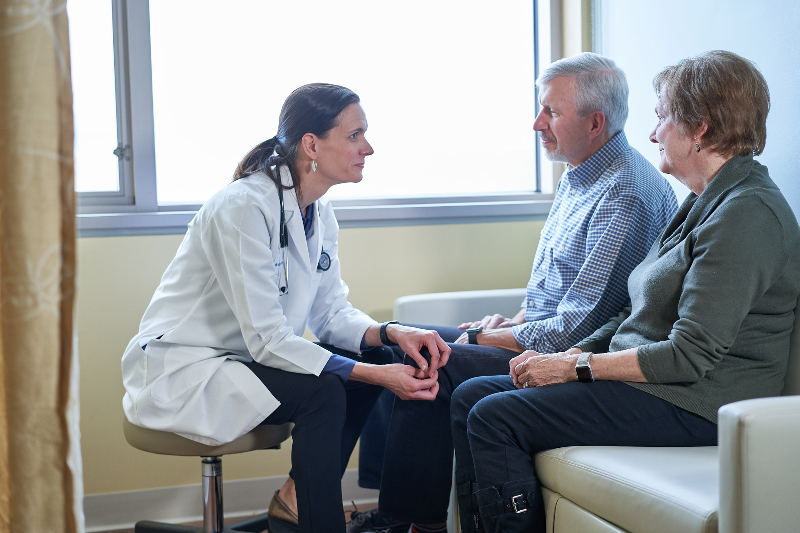Tatjana Kolevska, MD, told CNN that, to provide quality care, oncologists should balance the side effects of aggressive treatment with patients’ quality of life.

An integrated care approach to genetic testing and counseling
When patients are dealing with a potential genetic diagnosis for serious conditions such as breast or ovarian cancer, the need for accuracy, clear information, and support is critical. At Kaiser Permanente, our integrated care model offers access to state-of-the-art genetic testing and counseling, giving patients and their families the ability to explore and understand their medical care options and helping them to navigate and demystify what can be a difficult care journey.
Genetic counselors are highly trained health care professionals with expertise in medical genetics, genetic risk assessment, and counseling. They provide services to clients and their families for a diverse set of genetic or genomic conditions, including cancer, prenatal, pediatric, cardiac, and more.
The advantages of integrating clinical care and genetic counseling
Kaiser Permanente’s integrated care model enables genetic counselors to work with physician geneticists to coordinate care, supporting each other as part of a team to minimize delays due to pre-authorization, outside referrals, or other administrative obstacles. This ability for physicians and counselors to work together is one reason genetic counseling operates more efficiently at Kaiser Permanente than in other health care organizations.
Pim Suwannarat, MD, clinical geneticist and regional medical director for genetics with the Mid-Atlantic Permanente Medical Group, explains the value counselors bring to the care journey. “Genetic counselors explain what genetic testing is, identify the appropriate test, and then when the results come back, explain those results — whether negative, positive, or uncertain — in a meaningful way, not just for the patient, but for the whole family,” she says.
The role of genetic counseling in specialty care
Identifying hereditary cancer is one of the areas in which genetic counselors play an important role. Genetic counselors work closely with the oncology teams to help identify patients with a personal or family history of cancer and to help them understand their genetic testing options. They can interpret the meaning of the hereditary cancer test results for the patient and their relatives and provide information about recommended cancer screening exams and risk-reduction surgeries.
Related integrated genetic care story: 4 ways genetic counseling helps physicians, patients evaluate health risks
Genetic counselors also play a key role in the delivery of maternal and fetal medicine. When there is an abnormal ultrasound or prenatal screening test, genetic counselors meet with patients to discuss the meaning of those results, offer additional genetic tests when appropriate, and counsel patients on a path forward. “Part of the genetic counseling process is really about providing information and tools for families to understand their options,” says Dr. Suwannarat. “And if they make a decision, then to understand what the next steps might be.”
Improving quality of care by sharing information
Physicians and genetic counselors also share evidence-based medical information and best practices with colleagues outside of their care teams. “Through our community of practice groups on genetics and genetic counseling, we often brainstorm on new strategies so that we have a level of agreement or approach to testing and treatment,” says Dr. Suwannarat. “We also do a lot of messaging back and forth and connecting with our colleagues across geographic areas. I might have a patient who’s here in the Mid-Atlantic area and her family is in Southern California. If they want to get treatment there, I can help facilitate that because we have the extensive network and relationships.” This ability to consult and communicate clinically effective innovations across the organization helps improve the quality of health care for all Kaiser Permanente patients.
As experts in their field, genetic counselors contribute to clinical research, author academic publications and present on their work at national and international conferences. Some also are based in Kaiser Permanente’s molecular genetics laboratories, providing guidance to physicians, clinical genetic counselors, and other health care providers with genetic test and laboratory selection.
Genetic counseling that puts patients first
For patients, the right genetic counseling experience can make all the difference in the care they get.
“Overall, it’s about making sure that our patients are getting the testing information and support that is helpful to them and their family,” says Dr. Suwannarat. “Some patients think they’re going to talk to a therapist, but it’s really about making sure the patient knows what to do with their results, knows how to share that with their family, and knows the implications of that for their own care.”
Genetic counselors throughout all Kaiser Permanente regions provide expert, compassionate care to our members, either in person or through various virtual platforms. Their dedication to excellence is reflected in the consistently high patient satisfaction ratings they receive in our organization. Genetic Counselor Awareness Day is an annual opportunity to recognize their role in the practice of Permanente Medicine.
